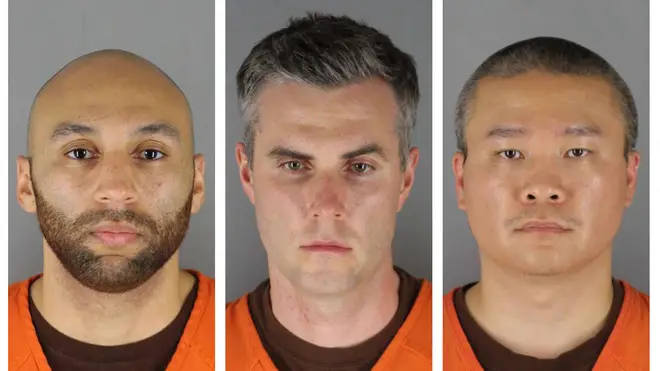
Ian Payne 4am - 7am
20 May 2021, 18:04

Thomas Lane, J Kueng and Tou Thao are scheduled to face trial next March on charges of aiding and abetting second-degree murder and manslaughter.
Lawyers for the state and for three former Minneapolis police officers charged in George Floyd’s death have appeared before the Minnesota Court of Appeals as prosecutors sought to add an additional charge to the case.
Thomas Lane, J Kueng and Tou Thao are scheduled to face trial next March on charges of aiding and abetting second-degree murder and manslaughter. Prosecutors want to add an additional count of aiding and abetting third-degree murder.
The three-judge panel has 90 days to rule. Based on an appeals court decision in February and a related ruling in the case of former officer Derek Chauvin that found the February ruling was binding, the judges could rule in favour of the state and send the case back to the lower court to add the charge.
“We think the Chauvin case should settle the matter here,” said Neal Katyal, a lawyer for the state, adding that the state could even charge all or some of the men as principle actors, not as accessories to the crime.

Lawyer Deborah Ellis argued for the defence that the three cannot be charged with aiding and abetting third-degree murder, because third-degree murder is an unintentional act and relies on a defendant’s reckless state of mind, but aiding and abetting must be intentional.
Judge Renee Worke called the argument “novel”.
Mr Katyal said that argument “is just wrong” and has no merit, but if it is considered it should go before the lower court for debate.
Mr Floyd, 46, died on May 25, 2020, after Chauvin pinned him to the ground with a knee on his neck as the black man repeatedly said he could not breathe. Kueng and Lane helped to restrain Mr Floyd – Kueng knelt on Mr Floyd’s back and Lane held down Mr Floyd’s legs. Thao held back bystanders and kept them from intervening during the roughly nine-and-a-half-minute restraint.
Chauvin was convicted last month of second-degree unintentional murder, third-degree murder and manslaughter and is awaiting sentencing. All four former officers also face federal charges accusing them of violating Mr Floyd’s civil rights.
The issue of the third-degree murder count has been complicated in this case.

In October, Judge Peter Cahill threw out a third-degree murder charge against Chauvin, saying it could only be sustained if Chauvin’s conduct had been “eminently dangerous to others” and not specifically directed at Mr Floyd.
But in February, a three-judge panel of the Appeals Court opened a window for that charge to be reinstated when it issued a ruling in an unrelated police shooting death. In that case, the court upheld the third-degree murder conviction for former officer Mohamed Noor in the 2017 shooting death of Justine Ruszczyk Damond. The panel ruled that a third-degree murder conviction can be sustained even if the action that caused a death was directed at a single person.
That led prosecutors to seek the reinstatement of the third-degree murder charge against Chauvin, and add a count of aiding and abetting third-degree murder for the other officers. Judge Cahill denied both requests, and prosecutors appealed. The Appeals Court then ruled that the Noor opinion set binding precedent, even though it remains before the state Supreme Court. Judge Cahill reinstated the charge against Chauvin.
Prosecutors say the other former officers should now be charged with aiding and abetting third-degree murder.